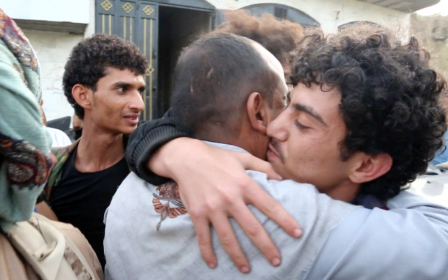Yemen: Pregnancy under siege

TAIZ, Yemen - I’m a journalist, and for the past 16 months I’ve been writing about the war in my country, Yemen, and the siege on my city, Taiz.
Despite the scale of the 16 months of conflict and the deepening humanitarian crisis in Yemen, it is still largely overlooked by the world's media and overshadowed by the headlines coming out of Aleppo, Baghdad, or even Brussels and Nice.
Peace talks broke down last weekend, and the Saudi Arabia-led coalition which is trying to oust Houthi rebels from power escalated air strikes shortly after. Eighteen civilians were reportedly killed when a warplane struck a market northeast of the capital Sanaa last Sunday, and 21 more deaths were reported last Tuesday in air strikes across the country. Like Syria, there are also sieges.
One underreported story is how the trauma of war has caused a surge of miscarriages, stillbirths, and neonatal deaths. This has become a deeply personal issue for me as I fear the next victim could be my pregnant wife.
I’m a newlywed, and I’ve always dreamt of having a child. When our doctor told me my wife was pregnant, I was so happy that I called my relatives and close friends to tell them the good news – so rare in the midst of the fighting.
Stay informed with MEE's newsletters
Sign up to get the latest alerts, insights and analysis, starting with Turkey Unpacked
For the first five months of pregnancy, it was nothing but joy. Then my wife fainted.
I was worried. Some 80 percent of the hospitals in Taiz have closed and there’s only one – al-Modhafar – that looks after pregnant women.
The doctors there told us that my wife had extremely low blood pressure and needed oxygen. We were lucky there was some available – Houthi fighters surround the city (they are battling fighters who are very loosely allied with Saudi Arabia) and the main way oxygen canisters make it in is via smugglers.
I myself had reported on the camels and donkeys that help bring these supplies in.
Despite our luck that time, the doctors said they couldn’t guarantee my wife the care she needed in Taiz, and that dozens of premature babies had already died in the hospital because of a shortage of oxygen and electricity cuts.
Later, the hospital manager, Fadhl al-Saberi, told me that the trauma of war has also caused more women than usual to go into premature labour.
The hospital got solar panels in February so it has more regular power now, but “we still don’t have enough oxygen cylinders,” he said. “We advise pregnant women who may need surgery or have low blood pressure to leave Taiz city.”
Inside Taiz, I managed to get folic acid (important for the development of a healthy foetus). But with my wife’s life at risk without access to oxygen, my excitement at meeting my first child had turned to constant worry that she would not make it.
So, like many others, we decided to leave home. We headed for al-Turbah, a rural area of Taiz Province that is now home to thousands of internally displaced people.
The journey itself was dangerous. It took seven hours to travel the 70 kilometres on a mountain road.
There, we found a public hospital that charges four times what they did before the war to assist delivery, but it had oxygen and could take care of my wife.
Finally, on 14 July, I became a father. My wife gave birth to a healthy son by Ceasarean section and both of them are well.
I’m relieved, and a proud father. But I’m also saddened that so many families have to go through this.
A few weeks after my son was born, I spoke to Lankani Sikurajapathy, a spokesman for the United Nations Population Fund in Sanaa.
He told me that the UN estimates that there are 90,000 pregnant women in Taiz alone and that some 4,500 have high-risk pregnancies.
While the UN doesn’t know exactly how many women have tried to leave Taiz to give birth, they have positioned services near "heavily conflict-affected zones of Taiz city,” Sikurajapathy told me.
It’s not just Taiz, of course, where families are suffering. Across Yemen, “women and girls lack access to humanitarian aid, including reproductive health services, and are therefore even more at risk of unwanted pregnancies, which, in turn, can put their lives at risk,” UNFPA country representative Lene Christiansen said in March.
UNFPA told me they are helping more than 200 health facilities with emergency obstetric care equipment for pregnancies with complications and to save the lives of newborns. They are also opening mobile reproductive health clinics for pregnant women or new mothers.
More than 6,600 Yemenis have died in this war. My wife and I would like to have more children some day. But for now, we will wait.
This article first ran on the IRIN news service.
Middle East Eye delivers independent and unrivalled coverage and analysis of the Middle East, North Africa and beyond. To learn more about republishing this content and the associated fees, please fill out this form. More about MEE can be found here.




